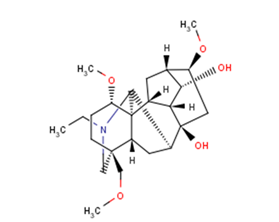
Talatisamine
CAS No. 20501-56-8
Talatisamine( —— )
Catalog No. M18219 CAS No. 20501-56-8
Talatisamine (12 μM) and TEA (5mM) inhibits the enhanced I(K) caused by Aβ4 oligomers, attenuates cytotoxicity of Aβ oligomers by restoring cell viability and suppressing K(+) loss related apoptotic response.
Purity : >98% (HPLC)
 COA
COA
 Datasheet
Datasheet
 HNMR
HNMR
 HPLC
HPLC
 MSDS
MSDS
 Handing Instructions
Handing Instructions
| Size | Price / USD | Stock | Quantity |
| 5MG | 116 | In Stock |


|
| 10MG | 197 | In Stock |


|
| 25MG | 347 | In Stock |


|
| 50MG | 498 | In Stock |


|
| 100MG | 752 | In Stock |


|
| 200MG | Get Quote | In Stock |


|
| 500MG | Get Quote | In Stock |


|
| 1G | Get Quote | In Stock |


|
Biological Information
-
Product NameTalatisamine
-
NoteResearch use only, not for human use.
-
Brief DescriptionTalatisamine (12 μM) and TEA (5mM) inhibits the enhanced I(K) caused by Aβ4 oligomers, attenuates cytotoxicity of Aβ oligomers by restoring cell viability and suppressing K(+) loss related apoptotic response.
-
DescriptionTalatisamine (12 μM) and TEA (5mM) inhibits the enhanced I(K) caused by Aβ4 oligomers, attenuates cytotoxicity of Aβ oligomers by restoring cell viability and suppressing K(+) loss related apoptotic response. Talatisamine can therefore be considered as a leading compound worthy of further investigations.
-
In Vitro——
-
In Vivo——
-
Synonyms——
-
PathwayOthers
-
TargetOther Targets
-
RecptorOthers
-
Research Area——
-
Indication——
Chemical Information
-
CAS Number20501-56-8
-
Formula Weight421.57
-
Molecular FormulaC24H39NO5
-
Purity>98% (HPLC)
-
SolubilityIn Vitro:?DMSO : 50 mg/mL (118.60 mM)
-
SMILESCCN1CC2(CCC(C34C2CC(C31)C5(CC(C6CC4C5C6O)OC)O)OC)COC
-
Chemical Name——
Shipping & Storage Information
-
Storage(-20℃)
-
ShippingWith Ice Pack
-
Stability≥ 2 years
Reference
molnova catalog



related products
-
MC-Gly-Gly-Phe
MC-Gly-Gly-Phe is a cleavable linker used for antibody-drug conjugates (ADC).
-
Dicentrine
Dicentrine, (-)- is an aporphinic alkaloid found in several plant species, which showed significant antinociceptive activity in an acute model of visceral pain in mice.
-
Padmatin
Padmatin is a component of the heartwood of Prunus puddum.



 Cart
Cart
 sales@molnova.com
sales@molnova.com


